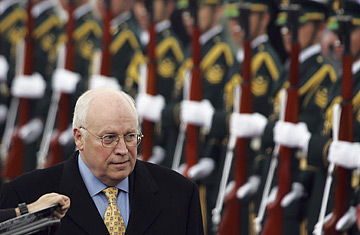
U.S. Vice President Dick Cheney arrives at Tokyo International Airport on February 20, 2007.
Cheney's visit comes at a time of growing unease in Tokyo that the U.S. and Japan may be drifting apart — and North Korea is one of the main causes. While Japan under new conservative Prime Minister Shinzo Abe has favored maintaining a hard line against Pyongyang, the U.S. was seen by some here as backing down at the recent Six-Party Talks, which culminated in an agreement that will give North Korea up to 1 million tons in fuel aid in exchange for shutting down its nuclear program.
Significantly, Japan refused to contribute to the aid unless progress is made on its core issue, the fate of Japanese citizens abducted by North Korea in the 1970s and '80s. While the Bush Administration publicly supports Japan's focus on abductions, it didn't escape notice in Tokyo that the issue took a clear backseat to denuclearization at the talks — and that the U.S. raised the possibility of removing North Korea from its list of terrorism-sponsoring states, something Japan vociferously opposes. "Japan felt betrayed," says Toshimitsu Shigemura, a professor of international relations at Tokyo's Waseda University. If Washington ignores the abduction issue, he adds, "the Japanese public will have doubts about the vitality of the U.S.-Japan alliance."
That perceived lack of solidarity from Washington — busy thanking Tokyo's rival Beijing for its decisive efforts at the talks — is especially galling given the Japanese government's steadfast support for the war in Iraq, up to and including President George W. Bush's recent "surge" in troop levels. But there are problems coming from Japan's side of the Pacific as well. Cheney pointedly did not find time to meet with Japanese Defense Minister Fumio Kyuma, who last month criticized the U.S. occupation of Iraq as a mistake, and termed Washington's attitude on intergovernmental negotiations over changing troop deployments at American bases on Okinawa as "bullying."
His remarks reportedly infuriated U.S. officials, but though Prime Minister Abe quickly reprimanded him, most Japanese agree with Kyuma — a poll this week found that 57% of Japanese opposed America's actions in Iraq. "Japan backed the U.S. on Iraq and what does it get from the U.S. in the Six-Party talks?" says Robert Dujarric, a security expert at the National Institute for Public Policy in the U.S. "Nothing, it seems."
Cheney, who was scheduled to meet on Feb. 22 with the parents of one Japanese abductee victim, calmed nerves in Tokyo by reiterating American support for the North Korean kidnapping issue, and diplomats on both sides are playing down talk of a divide over North Korea. "I don't agree with people who argue that Japan is being left behind [by the U.S.]," says a senior Japanese official. Certainly the American and Japanese militaries are only growing closer, as Japan sheds its postwar pacifism and asserts itself more vigorously in concert with the U.S. But any alliance needs shared goals to exist, and on the most pressing security issue in east Asia — North Korea — Japan and the U.S. may be discovering that even the best of friends sometimes have their differences.
